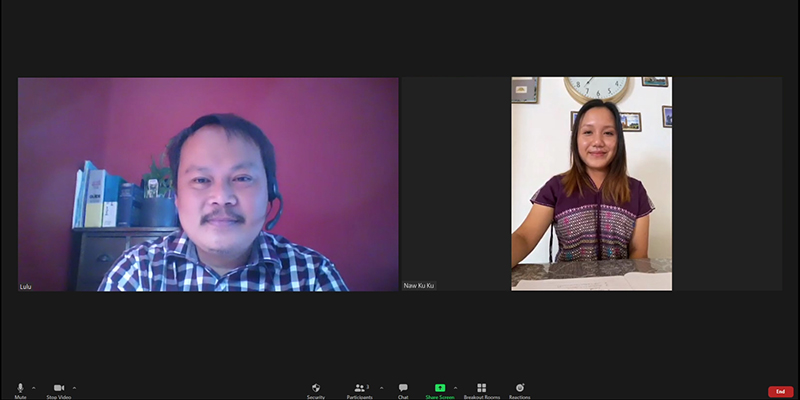Language plays a significant role in shaping our culture and identity, and the relationships we build with others.
At CatholicCare we see that differences in language can be an inhibitor for many, particularly refugees, to access the support services they need and build connections with others in their community.
But diversity in language and culture also provide the opportunity to advance inclusion, and it is through this lens that we celebrate International Mother Language Day on 21 February.

Image: Lulu (New Arrival Support Worker) in a Zoom meeting with Naw Ku Ku (refugee client).
Holding an understanding of both the barriers and opportunities that language diversity presents, enables us to empower refugees in ways that wouldn’t otherwise be possible.
Lulu, New Arrival Support Worker at CatholicCare Victoria, coordinates a variety of programs that support refugees and Culturally and Linguistically Diverse (CALD) clients.
A majority of participants (around 80%) in the programs he coordinates require support in their native language; providing this is key to ensuring that services meet their needs, and that they feel confident in communicating these needs.
Lulu speaks Pwo Karen, Sgaw Karen and Burmese, as well as English, which enables him to provide support to clients in their native language.
“Receiving support in their native language is really important for accessing services. It also helps clients to understand the services available, and is important in easing their hardship in whatever they are going through,” says Lulu.
Language barriers and opportunities
Lulu mentions that students who have little or no English skills struggle to cope with social norms where they are constantly needing interpreters to help them in their daily lives. “They can also lose confidence because English is required for learning in school, for speaking with friends… so many aspects of their life, and they can’t communicate,” says Lulu.
“Adults experience even more hardship as they need English language skills to find placement and support services, and to answer questions about their needs or provide personal details. It’s also harder for adults to learn and understand a new language because they have spent so long speaking their native language – they’ve devoted themselves to their own language and traditions.”
While teaching English language skills and providing support services in their native language can help to negate these barriers, Lulu mentions that language is also an important element in upholding their culture and traditions.
“Their language gives them certainty of who they are and where they come from,” says Lulu.
Naw Ku Ku’s story
Naw Ku Ku, a participant in Lulu’s refugee programs, arrived in Australia in 2006 after having spent the first 20 years of her life in a refugee camp.
For Naw Ku Ku and others like her who were (or are still) living in refugee camps along the Burma and Thailand border, survival is the top priority. Education, including reading and writing, is consequently of much lesser importance.
“I remember when I was living in the camp, military soldiers came to a village near the camp and they burnt it. We had to run because we were very close to it,” says Naw Ku Ku.
Naw Ku Ku was unable to speak English when she arrived in Australia, and at the time there was little opportunity for her to access the support of an interpreter to help with her settlement needs.
Today, she is able to understand and speak English, but accessing support in her native language (Karen) is still important to her when interacting with support staff.
“Language is very important because I’m more confident when speaking my own language,” says Naw Ku Ku.
Naw Ku Ku participates in CatholicCare Victoria’s cooking group, information sessions and excursions for refugees that run during the school terms.
Her children also attend a CatholicCare homework club, supporting the learning needs of CALD students from Prep to Year 12.
“I missed the group during the school holidays. It feels like this is family,” says Naw Ku Ku. “Without these programs, we would have missed opportunities, and my kids wouldn’t have homework support.”
Naw Ku Ku’s children, having been born in Australia, are more confident speaking English than they are in Karen. But Naw Ku Ku says it’s important to her that her children continue to speak their native language.
“I talk to my kids in Karen but they reply in English! I think it’s good that they speak two languages,” says Naw Ku Ku.
“As parents we worry that our children won’t be able to speak our Karen language fluently. We accept that they are born here and grown up here, but they need to learn mum and dad’s culture and language as well. Also, when you know two languages, you’re really clever and you have more chance than others to find a job!”
Using language to advance inclusion
Despite the variety of programs that Lulu runs, each of these are helping empower refugee and CALD clients by offering culturally relevant support in clients’ native languages.
CatholicCare’s cooking program is a key opportunity for participants to share traditional recipes, learn about other cultures and build a support network and friendships with others like themselves, even where language barriers exist.
Information sessions help participants learn about essential topics on health, finances, and legal advice – empowering them to increase their independence and wellbeing.
And for students in our homework groups, tutoring support gives them the confidence to try their best, work through challenges and achieve whatever goals they set their heart on.
What’s even better is that Lulu’s programs aren’t the only ones supporting refugees in their native language – CatholicCare provides a wide variety of support services for refugees and CALD clients in their native language, with multilingual staff and the support of interpreters.
Through our understanding of both the barriers and opportunities that language diversity presents, our goal is to empower each and every one of our clients to reach their full potential and live life to the full.
Liz Gellel | Communications Coordinator
Read more: